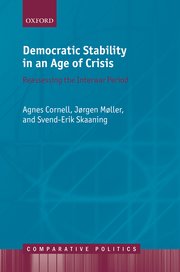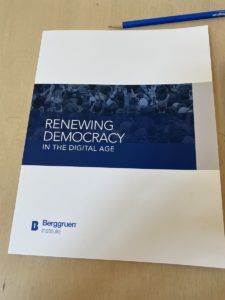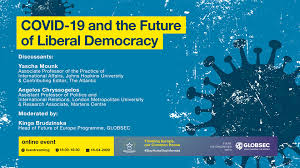Older democracies are better equipped to cope with crises like the current Covid-19 pandemic, while the risk of institutional breakdown is greater in new democracies with weak civil society and weak political parties, new research suggests.
In the last 10 to 15 years it has become popular to draw parallels between the interwar years and contemporary politics on the grounds that if crises undermined democracies in the former period, they would also do so in the present, University of Gothenburg Professor Agnes Cornell observes.
” While it may make sense to draw parallels between the two periods, the most remarkable trend during the interwar period is not that many new and fragile democracies broke down, but rather that so many democracies did in fact survive,” said Cornell, the co-author of a new book Democratic Stability in an Age of Crisis (Oxford University Press), with Jørgen Møller and Svend-Erik Skaaning.
Democratic legacy vital for stability
 The book highlights two interconnected factors that were vital for democratic resilience during the interwar period:
The book highlights two interconnected factors that were vital for democratic resilience during the interwar period:
- One was democratic legacy, that is, having experience with meaningful competition for government power via elections prior to the interwar years. …”In countries with democratic legacy, democratic modes of political competition were the norm among both ordinary citizens and elites. Ordinary people as well as the elite in older democracies were used to democracy. When a crisis hit, they did not call for a strong man or other anti-democratic solutions to solve problems. Instead, challenges were handled with democratic means, and, when necessary, the opposition and the ruling party cooperated to defend the democratic system.”
Link between ordinary citizens and the political elite
- The second factor important for democratic stability was the combination of robust and well-organized political parties, as well as a strong and vibrant civil society. This phenomenon, which the authors term a strong associational landscape, provided an important link between ordinary citizens and the political elite. This allowed for both the channeling and dampening of people’s frustration during crises.
 “Deliberative democracy research shows that, when given the opportunity to meaningfully participate in politics, citizens rise to the occasion,” Purdue University scholar Molly Scudder writes for the Berggruen Institute report on “Renewing Democracy In The Digital Age” (left).
“Deliberative democracy research shows that, when given the opportunity to meaningfully participate in politics, citizens rise to the occasion,” Purdue University scholar Molly Scudder writes for the Berggruen Institute report on “Renewing Democracy In The Digital Age” (left).
The COVID-19 pandemic “has given rise, in many states, to the increased assertion of authority by political executives,” said David R. Cameron, director of the MacMillan Center’s Program in European Union Studies, “an assertion that… has, in some states, resulted in an erosion and weakening of democratic norms and practices while, in others, it has reinforced and strengthened their reliance on authoritarian politics.”
 China was fully authoritarian both before and following the pandemic, said Taisu Zhang, Professor of Law at Yale Law School. The regime has successfully transformed the early outcry at the government’s poor response into a massive public relations win, which may encourage the government to centralize further and to impose greater authoritarian control, despite the potential for negative economic and social consequences, he told a webinar (above) on “Democracy and the Rise of Authoritarianism in a COVID-19 World.”
China was fully authoritarian both before and following the pandemic, said Taisu Zhang, Professor of Law at Yale Law School. The regime has successfully transformed the early outcry at the government’s poor response into a massive public relations win, which may encourage the government to centralize further and to impose greater authoritarian control, despite the potential for negative economic and social consequences, he told a webinar (above) on “Democracy and the Rise of Authoritarianism in a COVID-19 World.”
Harvard’s Future of Diplomacy Project will host an online discussion on how the U.S. and China are handling the coronavirus crisis and the ways that this experience might change the trajectory of global governance and military affairs with Senior Fellow, David Ignatius, columnist for the Washington Post. This seminar will be moderated by Professor Nicholas Burns. Wed., May 13, 2020 | 8:30am – 10:00am This seminar will be conducted via Zoom. Please register in advance.
 In the short term, the new coronavirus is likely to assist leaders with authoritarian inclinations, argues Ruth Ben-Ghiat, Professor of History and Italian Studies at New York University and the author of the forthcoming book Strongmen: From Mussolini to the Present. Authoritarians demand a society structured around vertical bonds between the leader and the people, she writes for Foreign Affairs. But…..
In the short term, the new coronavirus is likely to assist leaders with authoritarian inclinations, argues Ruth Ben-Ghiat, Professor of History and Italian Studies at New York University and the author of the forthcoming book Strongmen: From Mussolini to the Present. Authoritarians demand a society structured around vertical bonds between the leader and the people, she writes for Foreign Affairs. But…..
The social distancing required by the pandemic may lead to a new appreciation of the preciousness of the horizontal bonds that are crucial to the health of democracy. Those who desire more accountable, transparent, and compassionate leadership are sheltering at home right now, but they may emerge stronger and more united from this collective experience. Leaders now using the pandemic for personal gain will then have to reckon with the costs of their actions.







